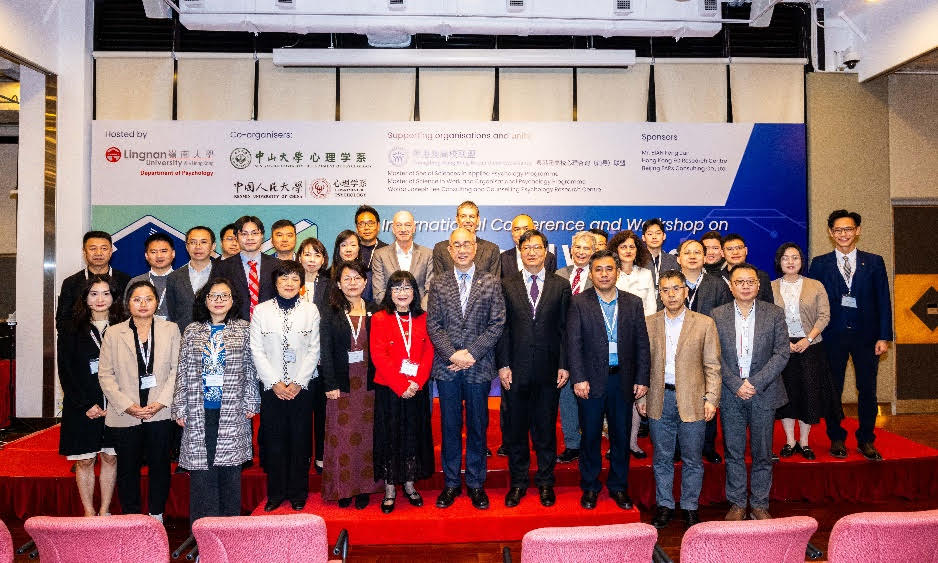Lingnan University co-hosts first AI-related psychology conference -
Interdisciplinary experts bridge psychological insights with AI applications
The intersection of technology and psychological health has become a critical area of enquiry in interpersonal, workplace and organisational contexts in the digital era. With the support of the Guangdong-Hong Kong-Macao University Alliance, the Department of Psychology at Lingnan University in collaboration with Sun Yat-sen University and Renmin University hosted the inaugural International Conference and Workshop on Health and Well-being in the Digital Era on the Lingnan campus today, 21 February. The conference will continue tomorrow, 22 February, on Sun Yat-sen University’s Shenzhen campus. It highlights the crucial role of psychological science in shaping AI applications across work, healthcare, and daily life, and attracted about 160 participants on the first day.
The two-day conference featuring a series of keynote speeches brought together 17 pre-eminent scholars, Artificial Intelligence (AI) experts, and industry leaders from Mainland China, Hong Kong, the US, the Netherlands, and South Korea to share their expertise on a variety of topics⸻from the impact of technostressors on work-life balance to the role of AI in supporting clinicians worldwide.
The conference began with welcoming remarks from Prof Raymond Chan Hon-fu, Vice-President (Academics) cum Provost and Lam Man Tsan Chair Professor of Scientific Computingat Lingnan University, who emphasised that as the world navigates an increasingly digital landscape, it is imperative to examine the implications of technology on mental health and well-being, saying “This conference provides a unique platform for sharing insights, research findings, and best practices, paving the way for innovative approaches to the challenges we face in this new digital era. Together, we can better understand how to leverage technology to reinforce health and welfare for individuals and society as a whole.”

Welcoming remarks from Prof Raymond Chan Hon-fu, Vice-President (Academics) cum Provost and Lam Man Tsan Chair Professor of Scientific Computing at Lingnan University.
Prof Siu Oi-ling, Head of the Department of Psychology, Lam Woo & Co Ltd Chair Professor of Applied Psychology and Director of the Wofoo Joseph Lee Consulting and Counselling Psychology Research Centre at Lingnan University, delivered the opening speech, highlighting the rapid growth of the Greater Bay Area (GBA) as an economic and technological hub, and the new social challenges brought about by AI. She suggested that psychology plays a pivotal role in AI development and implementation by ensuring that technology is human-centred, ethical, and beneficial to mental health and well-being, and also helps workers adapt to AI-driven job transformations and maintain psychological resilience.

Prof Siu Oi-ling, Head of Department of Psychology, Lam Woo & Co Ltd Chair Professor of Applied Psychology and Director of the Wofoo Joseph Lee Consulting and Counselling Psychology Research Centre at Lingnan University, delivers the opening speech.
“This conference brings together interdisciplinary experts who bridge psychological insights with AI applications. By exploring AI from a psychological perspective, the conference provides practical guidance on how it may be designed to align with human needs, promote well-being, and mitigate risks such as digital addiction, social isolation, AI-induced workplace stress, and burnout. The seminar also explores strategies for improving mental health in urban centres such as Hong Kong, Shenzhen, and Guangzhou,” Prof Siu said.
AI impact on employee well-being across workplaces
Internationally renowned organisational psychologist Prof Arnold Bakker from Erasmus University Rotterdam, one of the most-cited scientists in the world who is ranked in the top 200 across all disciplines, discussed the importance of harnessing the potential of AI to redesign job roles so as to promote employee interests, sustainability, and growth.

Prof Arnold Bakker discusses the importance of harnessing the potential of AI to redesign jobs in order to support employee interests, sustainability, and growth.
“Generative AI tools are redefining job roles by automating routine tasks, fostering creativity, and enhancing communication. These innovations affect job demands by reducing repetitive workloads while simultaneously creating new cognitive and social challenges. On the other hand, these technologies also serve as valuable job resources, offering immediate feedback, facilitating problem-solving, and supporting employee engagement. By applying the Job Demands-Resources (JD-R) framework, we may examine how organisations can strategically balance these demands and resources to maximise employee well-being and performance in an AI-driven work environment,” Prof Bakker said.
Prof Lu Changqin, Research Professor of the School of Psychological and Cognitive Sciences at Peking University, explained that employees are experiencing more technostress anxieties from rapid technological advancement in the workplace, due to their inability to adapt to such change, so that technostress is becoming a major employee pressure. Prof Lu discussed his research findings on the relationship between technostress and employees’ work-life balance.

Prof Lu Changqin explains that employees are experiencing more rapid technology stress in the workplace.
“Firstly, technostress correlates negatively with employees’ work-life balance, but secondly, job self-efficacy moderates this, and can help buffer the adverse effects of technostressors. Moreover, our research also found that technostress causes a high level of workplace objectification, and a digital mindset may cushion its harmful consequences.”
Lingnan professor proposes new direction for “human-machine collaboration”
Prof Jay Xu Jie, Associate Professor of the Department of Psychology at Lingnan University, proposed elevating human-system synergy through neuro-physiological computing, taking into account the growing integration of automated and intelligent systems into work environments. “These systems often fail to account for the nuanced and dynamic nature of human behaviour, leading to challenges such as human-machine conflicts. By leveraging tools like electrocardiography (ECG), eye tracking, and electroencephalography (EEG), we can capture rich physiological and behavioural data that help infer user states such as attention, workload, intention, and even team dynamics. These insights allow intelligent systems to successfully adapt to users’ needs, potentially reducing errors, resolving conflicts, and fostering better collaboration.”
Prof Xu added that integrating human sensing technologies into intelligent systems can transform them into active collaborators to improve performance, promote safety, and prioritise well-being in a progressively automated world.
Please click here to learn more about the first International Conference and Workshop on Health and Well-being in the Digital Era.





















